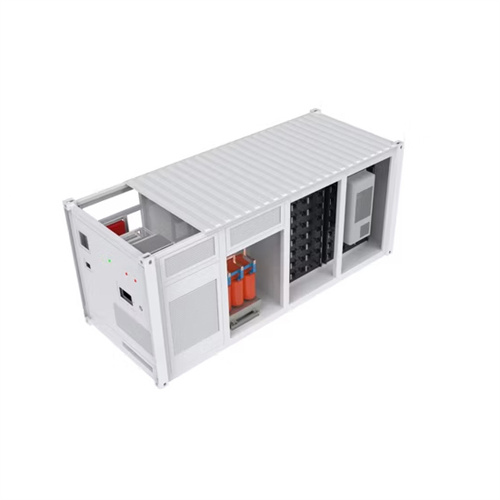Niger studio solar

Niger
The Sustainable Development and Inclusive Growth Strategy (SDDCI)², adopted in May 2017, is in line with the country''s international commitments, and has as objective by 2035, to "build a modern democratic, united, well governed, peaceful and outward-looking country as well as an emerging economy founded on a fair sharing of the fruits of progress". Since its

IFC Partners with Niger to Boost Access to Clean Power Through
Niamey, Niger, June 14, 2021 – IFC and the Government of Niger today announced a partnership under the World Bank Group''s Scaling Solar program to develop up to 50 megawatts of grid

Securing Electricity in Niger Through Renewable
The Niger Solar Electricity Access Project (NESAP), aimed at enhancing electricity access in rural and peri-urban areas of Niger through solar energy, started in 2017 and has built 15 solar power plants.

Niger seeking consultants for 60 MW solar-plus-storage project
Niger Electricity Co. has asked consultants to submit expressions of interest for feasibility, environmental, and social impact studies for a 60 MW solar-plus-storage project in western Niger.

OPEC Fund supports Niger''s solar energy development
The OPEC Fund''s loan will finance the construction and grid integration of the 10 MW Dosso solar plant. Only around 20 percent of the population of Niger have access to electricity; one of the lowest rates in Sub-Saharan Africa and with significant disparities between urban and rural areas and regions.

Starlink au Niger, une révolution numérique
La croissance d''Internet au Niger. En 2022, le Niger a enregistré un taux de pénétration d''Internet mobile de 37 %, marquant une hausse significative de 14 % par rapport

Developing Niger''s solar energy sector
Access to renewable energy will be increased and electrification scaled up in Niger thanks to a US$25 million loan from the OPEC Fund for International Development in support of the Niger Solar Plant Development and

IFC Partners with Niger to Boost Access to Clean Power Through
Niamey, Niger, June 14, 2021 – IFC and the Government of Niger today announced a partnership under the World Bank Group''s Scaling Solar program to develop up to 50 megawatts of grid-connected solar power, equivalent to roughly 20 percent of

Off-grid solar market assessment in Niger & design of
Off-grid solar market assessment in Niger & design of market-based solutions Final report – June 2017 The findings, interpretations, and conclusions expressed in this paper are entirely those

Securing Electricity in Niger Through Renewable Energy
The Niger Solar Electricity Access Project (NESAP), aimed at enhancing electricity access in rural and peri-urban areas of Niger through solar energy, started in 2017 and has built 15 solar power plants.

Savannah Energy Signs Agreement for 200 MW Solar Power Plants in Niger
Savannah Energy, a British independent power company, enters into an agreement with the Niger government to develop two solar photovoltaic power plants with a combined capacity of 200 MW. Learn about the project''s timeline, potential impact on the country''s electricity grid, and efforts to reduce carbon emissions.

Niger
With 80% of Niger''s population living in rural areas, the rate of electrification goes down to less than 1%. IFC is working with the government to identify private operators to design, finance, build, operate, and maintain grid-connected solar PV installations on an IPP basis, with the total combined minimum dispatch capacity of at least 50

3 FAQs about [Niger studio solar]
Who financed a solar power plant in Niger?
The European Union, the French Development Bank and the government of Niger co-financed the installation. A French consortium made up of Akuo and Sagecom has finished building a 30 MW solar power plant in Gorou Banda, Niger. The Niger government had initially planned the project to have a capacity of 50 MW.
Where is solar energy used in Niger?
Niamey and Zinder, located at lower latitudes, show less variability across the year, hence making them excellent locations for harnessing solar energy. There is a long history of solar energy use in Niger. This began in the mid-1960s when the Centre National d'Énergie Solaire (National Solar Energy Centre; CNES) was established.
How can Niger balance its energy mix?
This transformative project, funded by the World Bank through the International Development Association (IDA), will enable Niger to better balance its energy mix, which is currently largely dominated by thermal energy. This initiative is particularly crucial for a country that frequently faces climatic shocks.
Related Contents
- Niger bess solar project
- Niger ses solar energy solutions
- Powerfilm solar Niger
- Niger solar power plant manufacturers in
- Solar power for home appliances Niger
- The best solar panel brand Niger
- Niger best solar panels in europe
- Combined solar wind power systems Niger
- Niger tenaga solar jaya maju sdn bhd
- Niger solar panel wiring diagram with inverter
- Niger tier one solar panels